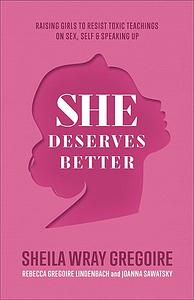Take a photo of a barcode or cover
challenging
informative
inspiring
reflective
medium-paced
Target audience is moms of pre-teen and teen girls but as a mom of little boys who grew up in Purity Culture I learned a lot for myself and also ways I'm hoping to teach my boys as I relearn myself. So glad more and more people are standing up to these crazy non biblical beliefs we took as fact
As a young evangelical woman (mid-20s) who grew up in the church, I was apprehensive about this book upon hearing about it, but when I realized who the authors were, I decided to give it a shot. I read it in a week, and it is now a key resource that I will be recommending not only to all youth ministry leaders and volunteers, but to evangelical moms of pre-teen and teenaged girls. This book is unique in that it is both evidence-based and written from a biblical world view. The perspective and "bigger picture" information was incredibly eye-opening and helpful.
The reasons I do not give a full five stars are as follows:
1. I would caution readers to remember that the stats in the book are all correlative, not necessarily causative.
2. Some of the quotes, descriptions, and references to Christian books and magazines about sex, Christian womanhood, and purity feel at times more like jabs and out-of-context extremes used to make points and make those authors look bad. While the quotes are, indeed, bad teachings, it feels as if the book sometimes focusses a bit more on the bad teachings (of the books, magazines, and church) and the bad "fruit" rather than how to correct them.
As I said in the beginning of my review, I highly recommend this book. I think all moms and youth ministry leaders--especially those who grew up in purity culture--should read it. The authors are highly esteemed and from a literary point of view, the book is very well-written and organized. My only caveat is that which I would say for any book: read it with critical thinking, and do not let the emotions of the negative teachings be the thing you take away from it. Rise above all of the toxic teachings and bad fruit, as the authors describe, and use the tools provided in this book to raise girls in a different way, because they do deserve better.
The reasons I do not give a full five stars are as follows:
1. I would caution readers to remember that the stats in the book are all correlative, not necessarily causative.
2. Some of the quotes, descriptions, and references to Christian books and magazines about sex, Christian womanhood, and purity feel at times more like jabs and out-of-context extremes used to make points and make those authors look bad. While the quotes are, indeed, bad teachings, it feels as if the book sometimes focusses a bit more on the bad teachings (of the books, magazines, and church) and the bad "fruit" rather than how to correct them.
As I said in the beginning of my review, I highly recommend this book. I think all moms and youth ministry leaders--especially those who grew up in purity culture--should read it. The authors are highly esteemed and from a literary point of view, the book is very well-written and organized. My only caveat is that which I would say for any book: read it with critical thinking, and do not let the emotions of the negative teachings be the thing you take away from it. Rise above all of the toxic teachings and bad fruit, as the authors describe, and use the tools provided in this book to raise girls in a different way, because they do deserve better.
This might be the best book I’ve read all year. I HIGHLY recommend anyone to read this who is raising girls, might raise girls, or has girls in their life that they love.
I found myself angry and disappointed as She Deserves Better put into words things that I regularly experienced growing up in the church. Read this, learn from this because she deserves better.
I found myself angry and disappointed as She Deserves Better put into words things that I regularly experienced growing up in the church. Read this, learn from this because she deserves better.
Doesn’t hold back in dismantling persistent damaging and harmful teachings to girls and women and how they relate to their bodies, their churches, and men in general.
The stats switching between “percentages” and “times” gave me pause. I also wondered at times if I as a father to a girl was meant to read it because of the mother/daughter sections, though I understand the heart of spurring meaningful conversations in contrast to some of the popular evangelical sources they quoted.
The stats switching between “percentages” and “times” gave me pause. I also wondered at times if I as a father to a girl was meant to read it because of the mother/daughter sections, though I understand the heart of spurring meaningful conversations in contrast to some of the popular evangelical sources they quoted.
Lots of good “what to avoid,” but I could use more “what to say.”
This book was so validating to me as someone who grew up in the tail ends of purity culture. Seeing the stats and having actual fact as well as a biblical reason to explain feelings I’ve had for a decade was wonderful. It sparked such an interesting conversation with my family as well once they saw I was reading it.
As a father of two girls, this book is super equipping when it comes to empowering conversations with my daughters that are practical, and non-toxic. A must read for any parent who has struggled with the effects of purity culture.
Sheila provides that gentle and fierce mom-friend advice we all need in our lives. And Rebecca and Joanna are so generous with their own experiences with growing up in purity culture.
This books is great for Christian moms who want to raise daughters who respect themselves and others.
But it's also great for women who are trying to find out who they are, to find their voices, in adulthood. Thank you, authors, for taking our experiences and working to make things better for future generations. And thank you for showing me hope that I also deserve better.
This books is great for Christian moms who want to raise daughters who respect themselves and others.
But it's also great for women who are trying to find out who they are, to find their voices, in adulthood. Thank you, authors, for taking our experiences and working to make things better for future generations. And thank you for showing me hope that I also deserve better.
I have mixed feeling about this book. I liked the overall topics and think they're good guides for what to teach our daughters, but I got lost in some of the arguments and logic.



